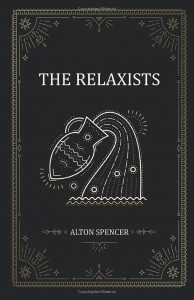
Oregon-based author Alton Spencer sent me a copy of his ruminative novel The Relaxists in exchange for a book review on this site. I recall a time in the nineties, in my teenage years, when I was enlivened by the breadth of knowledge in the world — particularly the overwhelming richness of human civilization’s cultural and literary history. There was so much to read and explore. It filled me with a youthful and perhaps naive excitement. The protagonist in The Relaxists, Edward Slowbe, reminds me of my sixteen year old self. He takes himself rather seriously, as I did. He sounds older than his years and older than his times — something my high school literature teachers critiqued in my fledgling attempts at creative writing. The narrative also brought me back to the quiet, early mornings I would spend amidst my late grandfather’s collection of books, row-upon-row on ornate bookshelves that he had built in my grandmother’s sixties bungalow. That my grandfather had died before I was born and that I had developed a sense of him only through stories, and the photographs and the books he left behind, drew me to explore. There’s a mystery to the vastness of our cultural heritage, to the ‘knowing’ that is out there and to how we absorb and apply this in our lives. The Relaxists captures that sense of dreamy enigma very well.
The young Edward Slowbe’s escape into learning and his discovery of a meditative, metaphysical experience that allows him to transcend his daily reality is tied to his traumatic childhood, of which snippets are revealed. His late father had been abusive and his mother, a woman of eclectic religious ideas, struggles with addiction. The novel doesn’t focus on this. This isn’t a story of trauma as such, although it does speak to the resilience of a boy, and then a man, who manages to find pathways to personal growth despite what he’s experienced. By day, Alton Spencer is a social worker and I sense that some of what he has seen informed his fiction.
At the heart of this story is the paradox of having to go deeper into oneself — whether through meditation or reflective prayer — in order to transcend oneself. Slowbe is seeking ways of knowing that surpass the here-and-now and the known dimensions of reality. There’s both a philosophical and a fantasy element to this work of literary fiction. Philosophically, we see the influence of first century Gnostic thought, particularly the concept that personal experience is a more potent way of connecting with the divine and obtaining religious knowledge than through the teaching authority (the Magisterium) of the Church. This desire to transcend is deeply aspirational: knowing oneself and one’s place in the broader universe leads to compassion for the other and harmony with one’s environment. This is later referred to as the truth of consciousness. A type of missioning prayer spoken by Slowbe encapsulates this:
To all that is greater than myself, to all that is beyond my understanding, to all that I am a part of, this is my intention: that I will not bear grudges or hold resentments against my fellow human beings, that I will embrace patience, that I will show love to myself and my fellow human beings, that I will trust and have faith in myself and in Creation, that I will let go of life as it arises and anchor myself in the eternal present moment.
While a highly reflective read centred around a protagonist absorbed with questions of self and identity, the book isn’t divorced from contemporary, worldly narratives. One of them is the intrigue that surrounds the election of a new pope, watching for the white smoke to emerge from the chimney of the Sistine Chapel and a storyline about the first American pontiff. Given the stark and sometimes vicious ideological divide in the U.S. Catholic Church, God help us all, one might add. But Pope Leo makes an appearance later in the story and he’s basically a gentle sort in many ways. He seeks interfaith dialogue and peace, and leads a Catholic Church where women can be ordained clergy. Also addressed in the novel are universal concerns around environmental degradation, water scarcity, as well as world peace.
Slowbe shares his metaphysical discovery with his long-time school friend Seven who lives in a house with a basement memorably nicknamed “the womb,” owing to the fact that “walls, ceiling, and floor were covered entirely in shag carpet.” Seven’s parents are musical and artistic in a seventies sort of way. At the start, the novel has a coming-of-age angle and the relationship between Slowbe and Seven, who had known each other since early childhood, propels this forward. Seven is an aspiring musician while Slowbe writes poetry. The two encourage each other in their creative pursuits. Yet as much as Seven is supportive of Slowbe’s poetry, he’s perplexed by his friend’s unusual meditative experience. He isn’t keen to try it.
Years pass and the novel leaps over them. Slowbe completes high school and university, and he returns briefly to his small hometown of Chillicothe in Ohio when his mother Isabella dies. This part of the novel is set a few years in the future. It’s not an unfamiliar storyline: the young man who leaves his troubled family and small hometown to seek education and success far away in a metropolis, the man who is alienated from his family during those years, only to return home at the time of a family tragedy. I was hoping for a scene or two exploring this tension, the broken relationship with his late mother and how it impacted his mourning, as well as his relationship with Father Berkshire, the parish priest who he had known his whole life and who breaks the news of his mother’s death. As Isabella’s death and Father Berkshire are mentioned, a scene exploring a visit back home, even if just a brief stop on a longer continental journey, would have added further dimension to Slowbe. But the story moves forward in a different direction. Slowbe’s friendship with his childhood friend Seven had continued all these years, as the two shared a flat in New York City. Slowbe had also relied on the more successful Seven for financial support until his poetry finally took off. He develops a friendship with the mystic philosopher and fellow writer Toussaint Riviere. Right when he receives news of his mother’s death and makes a brief detour in Ohio, he travels across the U.S. to build a new life in Portland, Oregon — partly to be closer to Riviere. Initially, we don’t learn much about Riviere as a person and about how he is a mentor to Slowbe, but we do hear of his writings and of his views on things like one’s ‘higher nature,’ the psychology of base instincts and ‘singularism.’ And later in the novel we learn that Slowbe hopes to find in him a father figure, given the terrible experience he had with his biological father.
We accompany Slowbe on this roadtrip westward, including through a storm of near biblical proportions and what starts off as a quiet night at a roadside motel with some beer and leisurely Internet browsing. But it’s CNN that enlightens him to what had happened that day on the world stage — a deadly, horrific car bomb attack against the United Nations headquarters in New York City and a world suddenly thrown off balance. Ever an idealist, it’s not only and perhaps not even primarily the personal human tragedy (the death of scores of people in the UN building) that haunts Slowbe, but more so what the attack means in terms of the demise of the UN and all that Woodrow Wilson stood for. It’s the end-of-an-era — a time of foreboding.
One of the characteristics of this novel is that it covers a long timespan; some chapters tend to leap several years into the future. We see Slowbe and the life that he leads evolve over the decades, but we don’t necessarily see as much development of relationships or scenes that appear significant in one chapter explored in the subsequent chapters. Some of these relationships do re-appear, such as with his childhood friend Seven, but the primacy of place in the novel is given to self-reflection and self-discovery. When Seven and Slowbe enjoy a long-distance call with each other (Seven is in London), the dialogue is self-reflection and philosophy. There’s not much banter or chit-chat about their personal lives. That leads me to another related characteristic of the novel: the depth of its philosophical leanings. Spencer has a wonderful grasp of the cultural and intellectual history of Western civilization and beyond. The novel also incorporates elements of Indigenous spirituality and thought, primarily through a friend of Slowbe’s called Red Horse. The focus is on the philosophy and cultural history being thoughtfully explored, more so than on an elaborate plot or character development. When the different characters in Slowbe’s life are brought together, the idea and context is a European-style literary salon — but with a twenty-first century technological twist. This circle and Slowbe’s new book becomes an international sensation. It even throws the Pope, who resurfaces after a few chapters, rather off balance.
The book speaks of the concept of the Kingdom of God being within the individual, taken from the Gospel of Luke. At its core, The Relaxists is a meditation on personal self-discovery and a highly experiential, aspirational and personalized spirituality as opposed to a communal spiritual experience based on the teachings and constraining authority of an institution, such as the Catholic Church. From the perspective of ‘organized religion,’ one might question whether something so personal and experiential is basically a privatization of the spiritual life. As I read the novel, I noted several times that some of this had a decidedly Unitarian Universalist flavour to it. As it turned out, my instincts were not wrong. What I found noteworthy, however, is the almost sublime manner in which some of Slowbe’s transcendental experiences are described. They are tinged with a type of sacramental language. And that’s not really Unitarian Universalist, but rather Catholic. It’s the concept that sacramental actions make grace visible in the world.
The Relaxists takes the reader on a tour of spirituality and philosophy spanning many centuries, while also looking ahead to the future world on our immediate horizon. It’s a thoughtful read where the traditional framework and pacing of a novel often gives way to reflection.

Thanks Chris – my interest is sparked in spite of my busyness. You have drawn in yet another reader who loves reading just for the joy of it.
Thanks for taking the time to read the review, Eleanor!